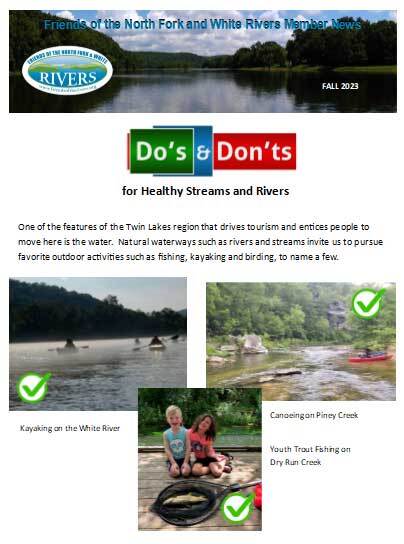Dos and Don'ts for Healthy Streams
October 5, 2023
Share This Page
Fall 2023 Newsletter (download here)
One of the features of the Twin Lakes region that drives tourism and entices people to move here is the water. Natural waterways such as rivers and streams invite us to pursue favorite outdoor activities such as fishing, kayaking and birding, to name a few.
Water brings our region to life. But sometimes, in living our busy lives, we damage the ecosystems that keep our waterways healthy. Actions like use of chemical fertilizers, dumping, careless disposal of used motor oil and littering are all detrimental to local water quality.Chemical fertilizers contain nitrogen, phosphorus and potassium, which persist in the soil and enter groundwater and run off, eventually entering streams. There they encourage overgrowth of algae that depletes the water of oxygen, or even creates toxins. Compost is a great alternative to use in gardens and for plantings. It will provide low dose and biodegradable nutrients that are easily absorbed by plants, then degrade to benign organic compounds. In lawns, use of hardy grasses will eliminate the need for fertilizer.
Our region is rural. For many of us, that is a positive thing. Here folks can have privacy and enjoy undisturbed nature. But one unfortunate rural custom that some people adopt is dumping. Leaving garbage and discarded appliances, or even vehicles, outside to decompose over time is a threat to local water quality. Toxic elements can soak into the groundwater. Lighter refuse such as paper or plastic will be blown by the wind into ditches and streams. This is a difficult problem to solve, as it’s often due to a lack of resources. But everyone can avoid littering, which is another form of dumping.
Even if we don’t dump or litter, some of us may cause harm by carelessly disposing of used motor oil. Oil and auto fluids are extremely toxic in the soil and groundwater. In addition, they are valuable resources if recycled. There are a number of local sites that accept used motor oil for recycling: O’Reilly’s, Auto Zone, the Baxter County Hazardous Waste Center on Hwy 5 south, and Walmart’s Tire Center. Just put the used oil in a well-sealed container for disposal.
A significant hazard to water quality is destruction of riparian zones along creeks and rivers like the White. Clearing the vegetation from river and creek banks is very detrimental to water quality because it allows significant amounts of sediment to wash into the water. The trees, shrubs and perennial plants that grow along the edges of waterways create a valuable buffer between the water and the land and the root systems are critical for holding the soil in place and preventing sedimentation in the river.
Friends of the Rivers is committed to monitoring local waterways to prevent these hazards from degrading our water quality. The Stream Team checks waterways like Dodd Creek in Mountain Home periodically and conducts educational programs for local high school students. Students learn how to monitor the creek for chemicals, how to measure streambank erosion and how to sample and evaluate macroinvertebrates that indicate water quality.
We cannot take our beautiful, natural waterways for granted. They are vulnerable. Add your voice to those who are trying to protect our local economy and quality of life by supporting rivers, streams and creeks. Please join Friends of the Rivers. If you’re already a member, get more involved. Spread the word about the importance of water quality. Donate to Friends’ projects, whether time or money. Each of us is important to this effort. Together we can keep our creeks and rivers healthy and vibrant.
We all need clean healthy water!
We cannot take our beautiful, natural waterways for granted. They are vulnerable. Add your voice to those who are trying to protect our local economy and quality of life by supporting rivers, streams and creeks. Please join Friends of the Rivers. If you’re already a member, get more involved. Spread the word about the importance of water quality. Donate to Friends’ projects, whether time or money. Each of us is important to this effort. Together we can keep our creeks and rivers healthy and vibrant.
Please help Friends of the Rivers protect our water.
Become a member.
Thank you
Steve Blumreich
President
Friends of the North Fork and White Rivers
417-839-0193
Sblum1326@gmail.com
